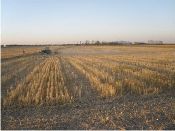| UNDESERT |
Understanding and combating desertification to mitigate its impact on ecosystem services |
| Time span: |
2010-2015 |
| Description: |
UNDESERT aims at combating desertification and land degradation in order to mitigate their impacts on ecosystem services, and following on human livelihoods. The West African region is central for understanding desertification and degradation processes, which are already severe and widespread as a consequence of climate change and human impact. An improved understanding of the effects of desertification and degradation processes is obtained on a local to regional scale by integrating remote sensing information with sound field data on biodiversity and soil as well as socioeconomic and climate data.
On this basis decision support models and tools will be developed and introduced to natural resource managers. UNDESERT also includes two very practical aspects,
1) restoration through tree plantations, which will be certified for CO2 marketing as the first restoration site in West Africa,
2) ecosystem management based on scientific data and best practices developed in close collaboration between scientists and local communities.
As a demand driven project, UNDESERT activities will be implemented by employing 17 young PhD students, who will receive training to enhance future capacities to manage risks and uncertainties in the frame of future demographic and climatic changes. The scientific results will be used to combat desertification and degradation directly and will be transferred to international programs in order to contribute to the implementation of relevant international strategies, initiatives and commitments of the EU and African countries. |
| Countries: |
Partners in Denmark, United Kingdom, Burkina Faso, Germany, Niger, Senegal, Benin
|
Website:
|
http://www.undesert.neri.dk/ |
|



